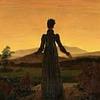Take a photo of a barcode or cover
Morrison's thesis is that American literature is indelibly shaped by blackness as a metaphor, created out of writers' experiences living in a nation with a sizable and sociopolitically significant black population, and that this metaphor is a powerful force even in works with no African American characters. It's an intriguing topic that would have benefited from a much longer and more detailed examination than this book provides.
I was also disappointed that Morrison didn't discuss or even gesture towards the presence of non-white and non-African Americans and what influence their existence might have had on the "literary imagination."
I was also disappointed that Morrison didn't discuss or even gesture towards the presence of non-white and non-African Americans and what influence their existence might have had on the "literary imagination."
Morrison's critique on some of the literary works have made way into her works and the narratives she has provided for her characters. Her point of view now exists adjacent to the literary canon - literature that has managed to normalize a stereotype into negative connotation. This action persevered into other mediums and then into everyday culture which Morrison heavily criticizes explaining both literary and long term cultural impact.
interesting readings of hemingway/etc. a little outdated re the state of litcrit tho: the things she says were completely ignored in 1991 (when this was written) seem to be the things modern criticism actually focuses on.
Started my foray into Toni Morrison's non-fic today, beginning with Playing in the Dark. This work was particularly good I thought, and probably the closest I will ever come to actually hearing a lecture by Morrison, and mostly examined the presence of 'the africanist' in American literature.
This was particularly useful to me as I have been considering doing a Masters in American lit but with a particular emphasis on African-American lit and this book gave me the exact lens that I needed to approach authors like Twain, Melville, Hawthorne, etc but still stay within my area of special interest.
Onto What Moves at the Margins now! More Toni Morrison chat soon!
Booklove,
Grace
EDIT:
It's nice to look back on my input above now that I AM doing a PhD in American Studies with a particular focus on African-American writing and I am reading this for class. Go me for fulfilling my dreams!
This was particularly useful to me as I have been considering doing a Masters in American lit but with a particular emphasis on African-American lit and this book gave me the exact lens that I needed to approach authors like Twain, Melville, Hawthorne, etc but still stay within my area of special interest.
Onto What Moves at the Margins now! More Toni Morrison chat soon!
Booklove,
Grace
EDIT:
It's nice to look back on my input above now that I AM doing a PhD in American Studies with a particular focus on African-American writing and I am reading this for class. Go me for fulfilling my dreams!
I shouldn't have read this book. I am not the target audience; chances are, you aren't either. This is a scholarly critical work, the kind with sentences like "establishing hierarchic difference to its surrogate properties as self-reflexive meditations on the loss of of difference". The kind that some academics swoon over, the kind that Alan Sokal so famously riffed; and if it wasn't for the seriousness of her subject matter -- the tragic absence of African voices in American literature -- I would be convinced that she, too, was poking fun at the academics. As it is, I don't know. I'm not smart or educated enough to understand even one sentence in ten, let alone figure out her tone.
If you read and study Willa Cather, Ernest Hemingway, Twain, and Poe; if you use "allegorical figuration" and "pleonastic reinforcement" in everyday conversation; by all means read this book. Have fun with it. Otherwise, don't bother. Morrison has so much more to offer us mortals.
If you read and study Willa Cather, Ernest Hemingway, Twain, and Poe; if you use "allegorical figuration" and "pleonastic reinforcement" in everyday conversation; by all means read this book. Have fun with it. Otherwise, don't bother. Morrison has so much more to offer us mortals.




